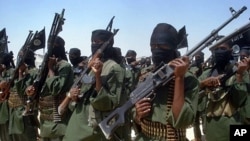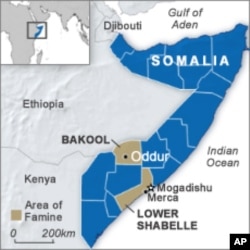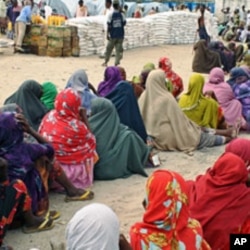One of the biggest obstacles to providing aid to Somalia has been the heavy hand of the al-Qaida linked militant group al-Shabab, which has so far dictated which aid groups are allowed in and which are banned. But some analysts say the crisis has actually weakened the militant group.
On July 6, al-Shabab spokesman Sheikh Ali Mohamoud Rage announced to the world that the militant group would lift a ban on foreign aid to Somalia to help victims of the worst drought in a generation.
Two weeks later, they reversed the decision. This time, Rage said the ban would remain, but the group would allow those humanitarian groups who had previously worked in Somalia.
Rift within al-Shabab
Abdiwahab Sheikh Abdi Samed, a Somali political analyst with Southlink Consultants in Nairobi, says the mixed messages were the result of a disagreement between the two main factions within al-Shabab.
“You know there are two groups, although this division has always existed, it remained hidden: those for the al-Qaida notion of what you call global jihadists, and those who normally are the localists - the local fighters who are close to the people,” he said.
The leading jihadists in al-Shabab come from Somaliland in the north, and trained with al-Qaida in Afghanistan. They are the ones trying to keep aid out.
But there is another sub-group that includes leaders from the Bay and Bakool regions at the heart of the drought who have been more open to foreign assistance.
Samed says this silent rift within al-Shabab has become more pronounced since the start of the food crisis that has now turned into famine in two regions of Somalia.
He says internal weakening, and a loss of faith in al-Shabab by the Somali people is tearing the group apart. “I'll tell you the truth, our inside story," said Samed. "The day's of al-Shabab are numbered. My biggest worry is only one thing - if the international community is allowed to provide food and water and basic necessities to the al-Shabab controlled areas, they will receive a logistical support so that they are now prolonging the fighting.”
Al-Shabab militants are notorious for their hostility toward western aid agencies and have been known to kidnap and even kill aid workers, while pilfering humanitarian supplies for their own use.
Their violent history has made many western governments and humanitarian organizations hesitant to send aid into Somalia, for fear that it will end up in the wrong hands.
Loss support
Rashid Abdi of the International Crisis Group says al-Shabab has also lost a lot of support from clan leaders and local communities, who blame the group for the current crisis.
He says as a result, he does not expect al-Shabab to relaunch attacks against humanitarian groups.
“I think because the situation has become so dire and so grave, I don't think al-Shabab will at this early stage do that. Because, again, they want to show themselves as responsible," said Abdi. "They want to be seen as credible interlocutors in this crisis.”
The drought and food crisis have hit especially hard in south-central Somalia, which is the heart of al-Shabab territory.
The crisis has forced many to flee, either for neighboring countries like Kenya and Ethiopia, or for areas of Somalia controlled by the government, where they know they can get food aid.
The Transitional Federal Government, or TFG, says this movement of people shows more faith in the government by groups of people in Somalia and support for the TFG position in the ongoing war against al-Shabab.
Government gaining control
Just Thursday the TFG announced a successful operation with African Union forces against al-Shabab in Mogadishu, and the TFG now claims to control more of the capital city than ever.
Somali government spokesperson Omar Osman says the point of the operation was to protect displaced people living in refugee camps.
“One of the reasons that the operation was a necessity was to ensure that humanitarian aid agencies get some kind of an environment where its safe and secure for them to operate," he said. "As you are aware, an al-Shabab mortar could easily land in one of those camps.”
But Osman also warns that al-Shabab has taken advantage of the crisis, and has recently recruited more than 1,000 young soldiers who see few other opportunities - a clear sign that al-Shabab's war is far from over.














